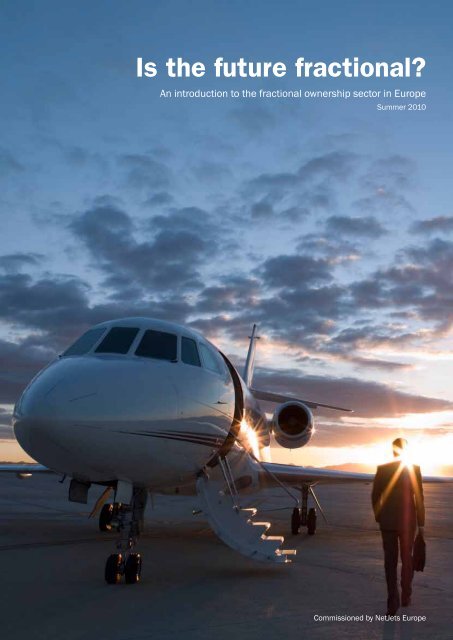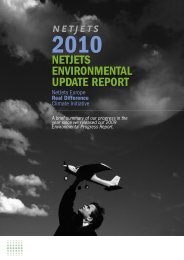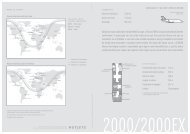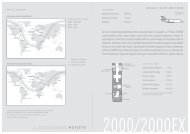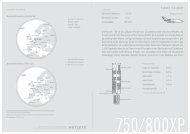Is the future fractional? - NetJets Europe
Is the future fractional? - NetJets Europe
Is the future fractional? - NetJets Europe
- No tags were found...
You also want an ePaper? Increase the reach of your titles
YUMPU automatically turns print PDFs into web optimized ePapers that Google loves.
<strong>Is</strong> <strong>the</strong> <strong>future</strong> <strong>fractional</strong>?Christian Jensen-Broby, MarriottMats Leander, <strong>NetJets</strong> <strong>Europe</strong>As <strong>NetJets</strong> <strong>Europe</strong> Executive Director Mats Leanderpoints out, <strong>the</strong> company’s business is predicatednot just on <strong>the</strong> affordability (or lack <strong>the</strong>reof) of aprivate jet, but also on <strong>the</strong> logistics of its operation.“An executive might need a corporate aeroplane totake <strong>the</strong>m from an airfield in Britain to Germany,but <strong>the</strong>ir own aircraft might be in New York at <strong>the</strong>time,” he explains. Ra<strong>the</strong>r than wait for <strong>the</strong>ir aircraftto be delivered, and pay for <strong>the</strong> fuel, positioningcosts, pilot’s time and all <strong>the</strong> o<strong>the</strong>r necessities, it’sa simple question of efficiency to use an equivalentaircraft in a fleet that is closer to home. <strong>NetJets</strong>operates <strong>the</strong> world’s largest fleet of private aircraft– around 800 worldwide – so ‘home’ can be almostanywhere, freeing our clients from <strong>the</strong> restrictionsof owning a single aircraft.”47 Park Street is an Edwardian-style developmentin London, owned by <strong>the</strong> Marriott Group. It offersshared ownership in full-service luxury property topeople who want an alternative to second homeownership. Christian Jensen-Broby, CCO and VicePresident for <strong>Europe</strong> and Middle East of <strong>the</strong>Division for Marriott, explains that it appeals to avery distinct group of people: affluent clients whorequire a London base <strong>the</strong>y can truly treat as <strong>the</strong>irown. As with <strong>NetJets</strong> <strong>Europe</strong>, a large majority (90%)of 47 Park Street’s customers are using <strong>the</strong> servicefor business reasons.The model is gradually establishing itself in<strong>Europe</strong>, as many individuals begin to look beyondtimeshares. Marriott’s Jensen-Broby says that40% of 47 Park Street’s customers are Americanstravelling regularly to <strong>Europe</strong>, but that he is nowseeing increased growth across <strong>Europe</strong> and Asia too.A recent report 2 indicated that Spain, Portugal,France and Egypt were seeing good growth in<strong>fractional</strong> ownership and that Croatia was taking<strong>the</strong> lead among <strong>the</strong> emerging <strong>Europe</strong>an nations.Fractional Owner View: Bhanu Choudhrie4Copyright © 2010, <strong>NetJets</strong> <strong>Europe</strong>Bhanu Choudhrie, entrepreneur, philanthropist and director of global investmentbusiness C&C Alpha Group, is a <strong>fractional</strong> owner with <strong>NetJets</strong> <strong>Europe</strong>.“If anything, <strong>NetJets</strong> actually saves me money, because if I couldn’t travel withsuch ease I’d have to employ many more staff to look after <strong>the</strong> internationalbusiness that I’m covering.“On a more personal level, a recent trip saw me fly from Paris to Switzerland toRome and <strong>the</strong>n to London in <strong>the</strong> space of two days. No o<strong>the</strong>r operation couldhave got me back to my family within that time frame.“<strong>NetJets</strong> gives me flexibility and freedom. I can fly to pretty much anywhere Iplease with a few hours’ notice and <strong>the</strong> service is second to none. Believe me,I have been approached by competitors, but no one can provide <strong>the</strong> level ofexpertise and quality you get with <strong>NetJets</strong>. My plans change on an hourly basisand my business simply could not cope without <strong>NetJets</strong>.”
<strong>Is</strong> <strong>the</strong> <strong>future</strong> <strong>fractional</strong>?Drivers of growthThe most significant developments in <strong>the</strong> <strong>fractional</strong>market have arguably only happened very recently.To begin with, people who use it have stoppedreferring to it as “<strong>fractional</strong>”, focusing instead onarticulating <strong>the</strong> benefits of shared ownership.Jensen-Broby sees this as a positive thing: “In <strong>the</strong>last two or three years we’ve seen a move awayfrom <strong>the</strong> trade jargon, and with this has come abetter understanding of what <strong>the</strong> model offers andhow it differs from its sister sector of timeshare.This can only be a good thing, as it differentiatestwo different concepts for two markedly differentcustomer types.”The recession has also brought <strong>the</strong> <strong>fractional</strong> modelinto sharp focus for many people and companies.With capital at a premium, savvy investors arelooking to maximise <strong>the</strong>ir investments. Leandercomments: “Many corporate jet owners havebeen trying to optimise <strong>the</strong>ir aircraft usage. Forexample, one corporate customer had 5-10 seniorexecutives that needed access to private aviationservices. Previously <strong>the</strong> company owned four jetsat a cost of $35-40m each. But its travel needsare varied – some days it needs large jets doinglong-range flights, some days small jets for shorthops, and some days multiple planes to differentdestinations. This can be a real challenge for even<strong>the</strong> biggest corporate fleet, and of course it’s almostnever cost-effective. By switching to <strong>NetJets</strong>, <strong>the</strong>ywere able to access our entire fleet whilst seeing<strong>the</strong>ir overall capital exposure reduced by 80%.”Nick Turner, The Registry CollectionNick Turner, vice president and head of high-end<strong>fractional</strong> leisure asset company The RegistryCollection, agrees: “For us, <strong>the</strong> credit crunch hasbeen a catalyst to growth. We saw a trickle ofinterest at <strong>the</strong> end of 2008, but true growth reallystarted in 2009, when it became much harder forpeople to justify full property ownership.”The trend looks set to continue, even as economicrecovery takes hold. As Leander explains: “We’rein an environment now where large capital outlaysfor corporate or personal assets are less desirablethan ever before, and this isn’t going to changejust because we’re beginning to see <strong>the</strong> initialsigns of recovery. Risk-averse individuals in thisnew economic era still want <strong>the</strong> benefits of <strong>the</strong>assets <strong>the</strong>y might previously have owned outright,but need to demonstrate sensible stewardship offunds, whe<strong>the</strong>r to <strong>the</strong>ir CFOs or to <strong>the</strong>ir spouses.”<strong>NetJets</strong> <strong>Europe</strong> owner Bhanu Choudhrie agrees“There’s increasing pressure for individualsand corporations to demonstrate that <strong>the</strong>y areresponsible in <strong>the</strong> way <strong>the</strong>y do business. For many,it’s simply not price effective to own <strong>the</strong>ir ownjets. The economic crisis has been a catalyst forchange. It has lead people to look to alternativesto meet <strong>the</strong>ir business or individual travel needs.The <strong>fractional</strong> model will get increasing attentionas people move fur<strong>the</strong>r down <strong>the</strong> path towardssustainable management of <strong>the</strong>ir businesses.”The global recession has also reduced <strong>the</strong>purchase price of <strong>fractional</strong> assets. For example,<strong>the</strong> price of shares in property and jets tends totrack <strong>the</strong> underlying market value of those assets.As <strong>the</strong>se have fallen, it has become even morecost-effective to enter into a <strong>fractional</strong> purchase.5Copyright © 2010, <strong>NetJets</strong> <strong>Europe</strong>


